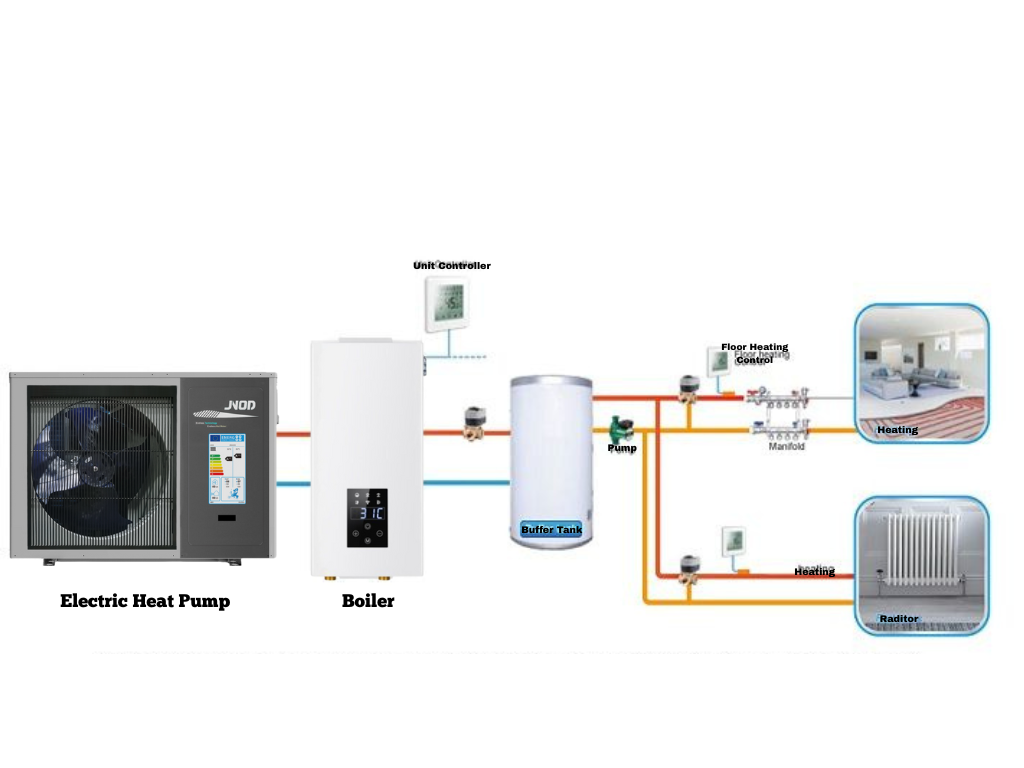Heat Pump with Electric Boiler: A Perfect Match Hybrid Heat Pump
You’re probably familiar with electric boilers, which use electrical resistance to heat your water. In cold climates, increased boiler usage can significantly increase your electricity bill. With a hybrid heat pump, you can enjoy ultimate comfort even in lower temperatures while saving on your bill.

What is a hybrid heat pump?
As the name suggests, a hybrid heat pump combines a heat pump, another heating system, and a smart controller to provide heating, cooling, and hot water to a home or building. The other heating system can use an electric boiler. A hybrid heat pump allows you to switch between two heat sources: an energy-efficient heat pump and a fast-heating electric boiler. This means you can enjoy year-round comfort, whatever the weather. Yes, we can do it
Hybrid heat pumps come in two common forms:
- Split system – The heat pump and electric boiler are separate.
- Integrated system – The heat pump and boiler are integrated into one system.
How does a hybrid heat pump work?
A hybrid heat pump intelligently switches between two heat sources based on outdoor temperature, energy costs, and heating demand, ensuring optimal comfort and energy efficiency.
Heat Pump Mode: In mild or cool weather, the system uses a heat pump to heat or cool your home and water supply. It absorbs heat from the air and transfers it to the water. This method is highly energy-efficient and environmentally friendly, and significantly reduces electricity consumption.
Boiler Support: When winter weather gets very cold, the heat pump’s efficiency decreases. At this time, the system automatically switches to an electric boiler to heat your home and produce hot water.
Smart Control System: It continuously monitors outdoor temperature, energy prices (if connected to a smart meter), and the amount of heating or hot water you need. It chooses the best option to save energy and costs while keeping your home comfortable.
Advantages of Hybrid Heat Pumps
Reduced Environmental Impact
Hybrid heat pumps are a solution for reducing carbon emissions. Hybrid heat pumps use a heat pump as the primary heating source, minimizing CO2 emissions. They can reduce natural gas consumption by 60-90%. This makes them an energy-efficient heating solution with a reduced environmental impact.
Compared to heating with a gas boiler alone, hybrid heat pumps can reduce CO2 emissions from heating a home by 38%. Hybrid heat pumps can nearly halve natural gas consumption for heating and domestic hot water production. This allows Europe to transition more smoothly from fossil fuels to a decarbonized energy system. Using an electric boiler as an additional heat source can further reduce carbon emissions.
Suitable for Different Building Types
The main advantage of hybrid heat pumps is their ability to monitor and switch heat sources, optimizing energy use and costs. This makes them ideal for large buildings or poorly insulated homes, where heat pumps alone may not be able to meet heating needs.
Currently, older buildings with poor insulation account for the largest proportion of Europe’s existing building stock. This is a significant advantage for consumers, as they can plan and incur the costs of building renovations in stages, such as gradually adding or replacing insulation.
Hybrid heat pumps are generally more compact than stand-alone electric heat pumps, and the electric boiler provides hot water without a tank, making them an ideal solution for apartments or small homes with limited space.
Comfortable, Easy to Use, and Maintain
Hybrid heating systems minimize waiting times for heating in cold weather and quickly provide warmth to indoor environments. They are easy to use, and anyone who knows how to use a heat pump or boiler will understand how to use one. Their controls and automatic setup features make them very convenient to use. The operating menu and thermostat work similarly to traditional systems, simplifying setup.
Because the system has two heat sources, even if the boiler or heat pump fails, heating and hot water supply will not be interrupted, reducing stress for both the customer and the installer.
Furthermore, hybrid heat pumps are a relatively familiar technology for installers, as installation, commissioning, and maintenance are similar to those of traditional heat pumps and boilers.
What are the costs of a Hybrid Heat Pump?
Hybrid heat pumps are more expensive to purchase than electric boilers, but cheaper than standalone heat pumps. Fortunately, many European countries have introduced subsidies and other policies to reduce investment costs. This government support enables many households to purchase heat pumps at favorable prices.
By converting a boiler to an electric heat pump, you can minimize your energy bills. With the introduction of variable electricity rates, the operating costs of hybrid heat pumps are expected to decrease further.
Furthermore, they are cheaper to install than standalone heat pumps because they don’t require a complete overhaul of the building envelope or heat distribution system upfront; instead, they can be retrofitted gradually after installation.
Conclusion
Hybrid heat pumps are a smart, flexible heating solution for homes and buildings. They combine an energy-efficient electric heat pump with a powerful electric boiler to keep you warm even in cold weather. Thanks to intelligent controls, the system adjusts to outdoor temperature and energy prices, helping you save money and stay comfortable.
Whether you live in a large house or a small apartment, they are a practical choice. They make it easier to switch from gas heating without sacrificing comfort and reliability.
We are also developing a hybrid system that combines a JNOD electric boiler with a JNOD air-source heat pump. This creates an intelligent system that automatically selects the cost-effective heating method for your home or workplace at any time. Contact us to discuss your options.
